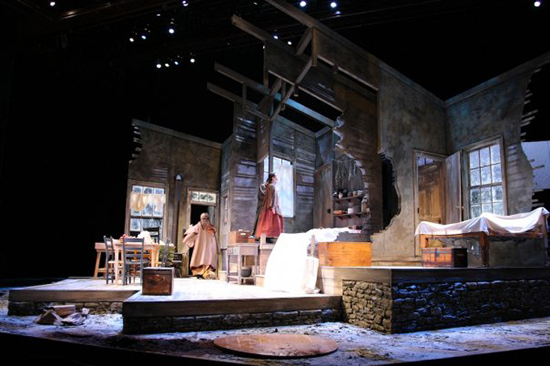Director’s Notes: Purposeful Ambiguity
Skip Greer, Director
Before I directed Dan O’Brien’s play The House in Hydesville, our mutual friend, literary director Marge Betley, had some advice for me: “You sure you want to take this on? Directing a Dan O’Brien play is not for the faint of heart.” Believe me, I knew what she meant. Marge, Dan, and I had worked together on one of Dan’s earlier plays, another ghost story of sorts, titled Key West, and we learned that Dan’s delicate, exacting, piercing, delicious language has the ability to turn artists inside out. Why? Because Dan’s the best I’ve ever read at creating “purposeful ambiguity.” Somehow Dan possesses the ability to make his language—indeed his entire stories—serve multiple purposes. I would talk to an audience member after a performance of Key West and they would tell me with absolute certainty that such and such happened, and it meant such and such. The next person would tell me the exact opposite, and yet they’d seen the same play, the same performance actually. For a director, that’s both intoxicating and terrifying.
 |
| Kristin Griffith as Margaret, Lauren Orkus as Cathie |
Dan’s play The House in Hydesville did not disappoint. Geva Theatre Center commissioned the piece and developed the play because the story was born of our region. The Fox sisters, generally regarded as the founders of the Spiritualist movement, first confronted the ghost of Charles B. Rosna in Hydesville, New York, just a stone’s throw away from our homes here in Rochester. We knew that our audience would see themselves represented in what we created on our stage, and we all wanted a rip–roaring good ghost story that would keep each of us up at night. Still, we each wanted different things as well. Marge wanted to explore a universe in which ghosts were possibly real; tangible, communicating entities. Dan wanted to find a way to explore a family’s dysfunction and I believe wrestle with the question, “Can we escape who we come from?” (My words, not his.) And I wanted to touch the roots, the beginning of a religion born of necessity. I worried then, as I do now, that religions around the world seemed to be posturing themselves into opposition, and I thought we could use this story to explore whether religion is a tool that serves us, or a tool that we use on each other—or possibly both. I wanted to fire a warning shot.
I suggest that with The House in Hydesville the Fox sisters have found their poet. Only in Dan O’Brien could we have found a writer skilled enough to allow us to watch his play, and come to realize that somehow Dan had accomplished all three of our desires. He’d won us with his “purposeful ambiguity.” He’s a masterful writer, a wordsmith, and often his play will turn on a single period or a comma, it will float frighteningly suspended in a pause, and then it will crush us with its sparse humanity.
I actually grew up in a house with a ghost. I did. Be careful as you read an excerpt of this play because Dan’s writing is so good, so precise, that you may realize that you did too. ![]()
Skip Greer has worked as a director, actor and teacher for over thirty-five years. He directed the world premiere of two Dan O’Brien plays, Key West and The House in Hydesville. He serves as the Artist-in-Residence and Director of Education at the Geva Theatre Center.
Cast & Crew
Playwright’s Notes
Director’s Notes
Dramaturg’s Commentary
How is History Made?
The Rapping
from Act 1, The House in Hydesville
Contributor’s notes
Introduction & Table of Contents